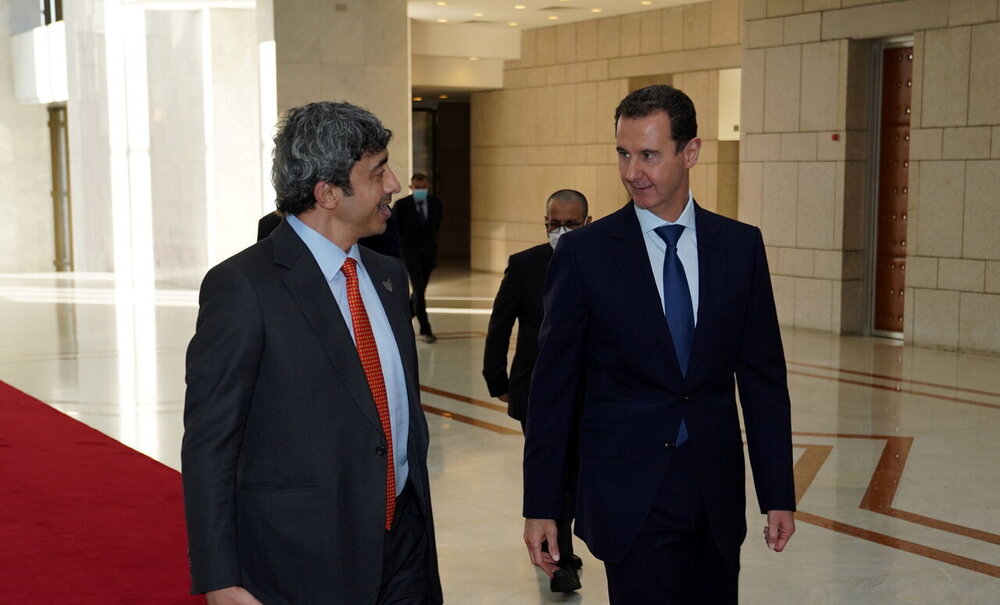Jafar Ghannad Baashi in an interview with the site of Strategic Council on Foreign Relations pointed out that there are different and contradictory analyses about the willingness of Arab states for resumption of relations with Syria. He added:” Practically speaking, at the moment we witness initiatives that can pave the ground for normalization of relations between Araba states and Syria”.
He continued:” Now, we witness what some reactionary Arab states were trying to materialize within several years of internal war in Syria is not realized, on the contrary to their intentions and also various measures to topple the political system of Syria and unseat Bashar Assad from the power scene of the country, a reverse trend has been passed”.
Having stated that the image that is now being depicted for the efforts made by Arab states to resume their relations with Syrian government in news and analytic media, is not an honorable image for Arab reactionary, Ghannad Baashi emphasized:” some analysts believe that present efforts of Arab states to resume relations with Syria represent a kind of failure, defeat and abashment emanated from their performance during several years of warmongering in Syria more than anything else”.
The expert continued:” from the same analysts point of view and some other experts, the present situation can pave the ground to materialize some of Syrian demands in economic and even political fields because now Syria intends to implement plans for reconstruction of damages caused by several years of wars and due to the present demands of Syrian population take action to renovate in some areas”.
According to Ghannad Baashi, that’s why the resumption of relations of oil rich Arab states with Syria pave the required ground for Arab investments in some areas of Syrian government interest, and this is the very same thing that Syrian government needs strongly.
He continued to explain:” Yet, from the reactionary Arab states’ point of view close relations with Syria can also bring about other results required by them; i.e. encouraging Syria to join conservative countries and drive a wedge between the country and other countries of the axis of resistance. In this respect, some experts even refer to intelligence and espionage measures of Western countries through Arab investments in Syria too. They believe any kind of investments made by Arab states in Syria, particularly those countries that have established their relations with Israeli regime, can be a suitable ground for infiltration of security and intelligent officers of the West and the Zionist regime”.
The expert continued:” the elements are also trying to target the defense capabilities of Syria through this way. Among their hostile targets is to weaken the Syrian Army”.
Having stated that the resumption of relations of Arab states with Syria is like a double edged sword that can put forward very different consequences, Ghannad Baashi said this sort of relation requires a lot of watchfulness and surveillance.
The expert of the Middle East affairs explained about it:” the West and the Zionist regime are trying to call Hezbollah and Hamas group as terrorist organizations from one hand, and having admitted the strong political status in Syria to loosen the present links in resistance movement from the other hand, and thus drive a wedge of their concern among the countries of axis of Resistance”.
He underscored:” However, in practice and in view of many factors exist on the field and also the measures taken or will be taken by Syrian authorities, driving such a wedge and division among Resistance front is unlikely and this is the very same rule governing over the friendly and strategic relations between Iran and Syria”.
Finally, Ghannad Baashi commented on the possible participation of Syrian government in the upcoming meeting of Arab League in Algeria and said:” the measure by itself contains two messages both of which are in favor of Syria and simultaneously indicate the failure and abashment of Arab states; the probable participation by Syria represents the stability and strong status of Damascus government from one hand and a clear indication of Arab reactionary defeat in their previous efforts to expel the country from the Arab League from the other hand”.










0 Comments